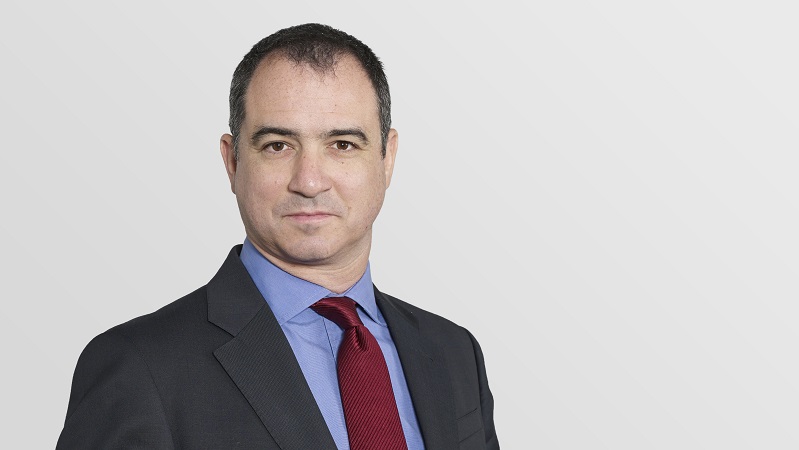Invesco still has a long road ahead of it as it tries to stymie outflows from its UK range despite the exit of Mark Barnett, who has suffered poor performance and been tarnished by his association with his predecessor Neil Woodford.
Ciaran Mallon and James Goldstone will now assume control of the outgoing fund manager’s £5bn worth of UK equity strategies, including the Invesco Income and High Income funds. Assets from the smaller Strategic Income are to be merged with the Income mandate.
Barnett’s exit followed a review of the UK equities desk by newly-minted CIO Stephanie Butcher.
But while a shake-up of the UK equities fund range is being welcomed, fund buyers Portfolio Adviser spoke to felt Barnett’s exit will not be a quick fix for Invesco’s outflows problem, which it has struggled to stymie since Woodford exited to set up his own boutique in April 2014.
Mark Barnett suffered from both Woodford’s rise and fall
Morningstar data crunched by Portfolio Adviser highlights that Barnett’s association with Woodford hurt him both as assets followed the star fund manager to his eponymous boutique and then when his performance faltered, ultimately leading to his firm’s collapse five years later.
Invesco High Income, which was £12.9bn when Barnett took the reins in June 2014, saw investors pull £1.9bn in the first year, according to data from Morningstar. Today it stands at £3.3bn with a small chunk of that loss coming from market movements on top of £8.6bn of redemptions.
Those redemptions match almost exactly the amount pulled in the period since Woodford Equity Income suspended.
In the 11 months since last June, Invesco High Income has been battered by net outflows of £1.9bn, according to Morningstar, while Invesco Income saw investors yank £752.5m. The smallest of Barnett’s funds Invesco UK Strategic Income saw £83.1m exit over the same time period.
“Poor Mark has been running those funds in redemption since the second he took over,” Chelsea Financial Services managing director Darius McDermott says.
> See also: Mark Barnett funds top list of biggest laggards as outflows bite
Barnett was hit by a double whammy of having to carry on Woodford’s legacy and poor performance due to the funds’ out of favour contrarian style, McDermott says. All three funds are lingering near the bottom of the IA UK All Companies sector, handing investors losses of 40% on a three-year view.
“It was obviously a cross too heavy for him to carry, and you might argue that it was a cross too heavy for anybody to carry.”
Overlap with holdings in the Woodford Equity Income fund, which is in the process of being liquidated, has also made life difficult for Invesco’s UK equity income franchise.
Invesco Income and Strategic UK Income have been similarly battered by net redemptions since Barnett took over, with £5.2bn exiting the former and around £708m from the latter.
Changing of the guard unlikely to curb outflows
But the leadership shake-up is not expected to alleviate outflows immediately.
Incoming managers Mallon and Goldstone have run smaller amounts of money at Invesco than Barnett and Woodford and are not as high profile as their predecessors.
Mallon has been the lead manager on the £301.5m Invesco Income & Growth fund and £143.8m Income Growth trust since joining the UK equities desk in 2005 and a co-manager on the heftier £1.9bn Invesco Distribution and £2.1bn Monthly Income Plus funds, alongside fixed interest co-heads Paul Read and Paul Causer, since 2013.
Goldstone, who joined more recently in 2012, took over Barnett’s trust Invesco Perpetual Select UK Equity in October 2016, followed by his Keystone Investment Trust six months later. He was also a co-manager on the Edinburgh Investment Trust which Barnett lost to Majedie last December.
“I am not sure that money will flood in because they are there,” says 7IM senior portfolio manager Peter Sleep.
Incoming managers will have easier time coping with outflows than Barnett
One fund buyer told Portfolio Adviser they were “pretty underwhelmed” by the appointment, describing Mallon as “at best solid”.
“It’s not like there’s a young gun that they’ve been gently warming up and they can go, ‘Look, here’s this nice young 20- or 30-year-old girl or boy who’s got loads of promise’.”
Willis Owen personal head of investing Adrian Lowcock thinks there could even be a spike in outflows as DFMs and professional investors wait to assess the situation and meet the new team before choosing to invest or rate the fund.
But he adds the pair, who are taking on £4.9bn worth of funds should have an easier time managing outflows than Barnett who inherited a circa £30bn mandate from Woodford.
Stephanie Butcher’s overhaul could help UK desk bounce back
While fund buyers may be reticent of Invesco’s UK equity income franchise until the dust has settled, Sleep thinks the UK desk will start to do well because of Butcher’s shake-up.
He sees the overhaul as necessary to bring Invesco in line with global fund managers like T Rowe Price and Fidelity that have stronger coordination between analysts, fund managers and the risk team. Invesco’s equities desk has suffered from being too siloed, with each team working independently of one another and having their own analysts instead of sharing ideas across teams, according to Sleep.
“Invesco seemed to say, we don’t need really need analysts, maybe one or two, but not a global team,” he explains.
“We will give our PMs a Reuters screen, a copy of the FT and Portfolio Adviser and we will let them do what they want, so long as they outperform. The PM wants to punt on the Brexit vote or the outcome of the general election that is fine. That model does not work.”
However, it could be a long time before the UK equity desk’s performance picks up.
Invesco High Income, Income and Strategic Income performance under Mark Barnett (25 June 2014-present)
| Fund | AUM as of 31 March 2020 | Total return (%) |
| Invesco High Income | £3.3bn | -23.7 |
| Invesco Income | £1.5bn | -24.3 |
| Invesco Strategic Income | £102.2m | -27.2 |
Source: FE Fundinfo
“I still think there is a long way for Invesco to go, but I think the only way that the UK desk can bounce back is by learning that the best way to outperform is not to work on their own, but to use the global reach and research of their firm and to take those ideas and implement them in a risk controlled fashion,” he says.
Invesco unlikely to become a growth house
Despite the overhaul to the equities business, McDermott reckons Invesco will stick to its value-oriented roots – the out of favour style that has contributed to its flows problem.
“The equity business, whether it be in Japan, emerging markets, global, UK or Europe has been contrarian and value oriented. That has been their style,” McDermott says.
“Now is Stephanie Butcher going to turn that round into a growth shop? I doubt it. I don’t think she could, because that would basically mean all of the managers leaving. And unless Invesco, the American Plc, has given her that remit, I can’t see it.”
McDermott expects Mallon and Goldstone to follow a similar value style to Barnett and Woodford, with Mallon having worked with the duo on Invesco’s UK equities desk since 2005.
But he describes the pair as more “core investors”. “You’re not going to see 9% in Astrazeneca and 8% in Glaxosmithkline as we’ve seen with Neil in the past.”







